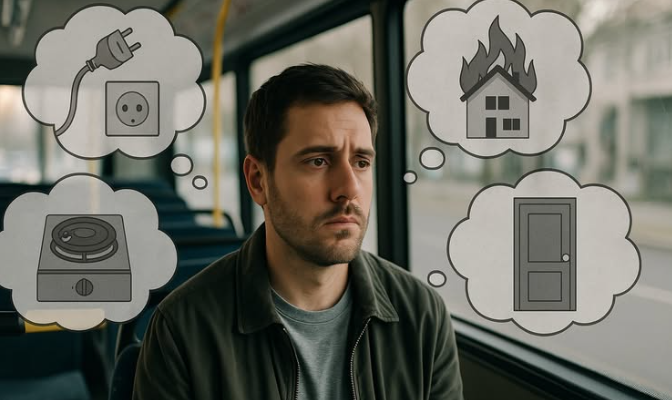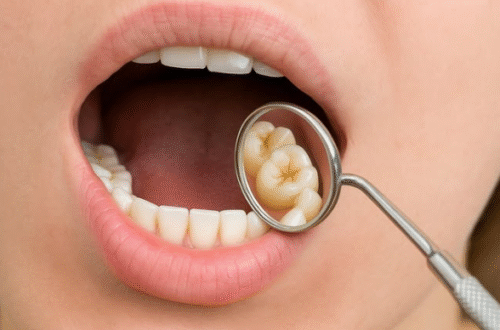Just think, checking the door before leaving the house repeatedly to see if it’s locked, unplugging the iron, unplugging the computer, turning off the gas stove, or washing our hands a little too often, things like that happen to us too. These are normal checks and precautions. But what if these things become uncontrollable, annoying, and overwhelming, and disrupting our daily routine? Then it could be a serious condition called OCD (Obsessive-Compulsive Disorder), which affects our lives. Let’s see what it really is, why it happens, and how to get rid of it.
🤔 What is OCD (Obsessive-Compulsive Disorder)? Obsessive thoughts and actions that can’t be stopped!
OCD is a mental health condition. Simply put, in this case, you have uncontrollable, disturbing thoughts (we call these Obsessions), which cause you to feel very anxious. Then, you feel the need to do certain things to reduce that anxiety, or to be afraid that something bad will happen to you (we call these Compulsions).
Obsessions:
These are thoughts, images, or doubts that come to your mind without your consent, that come up frequently, that bother you, that cause you great fear or anxiety. Even though you don’t want these thoughts, you can’t get rid of them and they bother you.
✔️ Imagine, when Nimali goes out, she feels that germs and diseases are everywhere. She can’t bear that thought, and she gets very anxious, thinking, “I’m going to get sick, and my family will get sick too.”
✔️ If Sameera doubts whether she turned off the gas stove, locked the door, or closed the window before leaving the house, she cannot get rid of that doubt. Fearful thoughts like ‘If I don’t do it right, the house will catch fire, thieves will come, and everything will be destroyed because of my fault’ keep coming.
✔️ Kasuni wants the books, pens, and files on her desk to be all in the same order, symmetrically, like a string. If it moves a little, or if someone changes that order, she feels very uncomfortable, thinking ‘everything is messed up, something bad will happen now, I can’t bear this’.
✔️ Ravi sometimes thinks that he will do something bad to someone he loves, or that he will say/do something wrong, something indecent, or something that will harass someone without control. When such thoughts come, he feels very ashamed of himself, afraid, and feels like a bad person.
✔️ Chamari believes that certain numbers (e.g. 13) and colors (e.g. black) are ‘unlucky’. If she sees that number, or if she has to wear that color of clothing, she has a great fear and anxiety that something bad will happen to her or her family that day.
Compulsions (Rituals):
These are the anxiety caused by those obsessions that torment her, the actions or mental rituals that you do to reduce the fear or prevent the bad thing you think is actually happening, sometimes even though you think it makes no sense, but you feel like you have to do them to the point of not doing them.
▶️ Nimali, who is afraid of those germs, washes her hands about fifteen times a day to reduce that anxiety, sometimes for several minutes, until her hands are dirty. If she doesn’t do it, she has no relief. If he comes out, he washes himself and gets all the clothes he has worn washed.
▶️ Sameera, who is suspicious about the gas stove and the door, leaves the house and gets on the bus, and when he starts to worry about “Did I turn off the stove?”, he comes home and checks all the stoves, doors, and windows. Sometimes he is late for work or an important trip because of this.
▶️ Kasuni does not let his desk become even a little messy. He arranges the books according to height, color, and direction of the letters. This can take hours. He does not feel like doing anything else until it is exactly “right”.
▶️ When Ravi has those bad thoughts, he recites ‘Don’t do that, I am a good person’ a hundred times in his mind (mental ritual). Or, he does something good that he does as a habit (e.g., praying, reciting the Itipiso verse) several times to “neutralize” that thought.
▶️ If Chamari sees an unlucky number, he mentally says the number he thinks is his lucky number seven times, intending to ‘cancel’ it, or he will open the way to any road with that number, no matter how far away it is.
In OCD, these thoughts (obsessions) and actions (compulsions) are intertwined and cause a lot of stress. This is very different from us usually checking something a little, or being a little tidy. Because OCD causes a lot of disruption to a person’s daily life, work, and relationships, and they focus on these things most of the day.
The good news is that treatments such as Cognitive Behavioral Therapy (CBT) can help a lot to break this cycle. Some people also need to use medicine.
If you think you have these symptoms, if your life is disrupted by disturbing, hard-to-control thoughts and the actions you feel like doing because of them, the first thing you need to do is to see a parent or an adult you trust, a doctor, or a mental health professional to find out about it.
🤯 Common types of obsessions
Obsessions are not just thoughts, they are thoughts that are disturbing, anxiety-provoking, and difficult to control. OCD causes these thoughts to come to mind over and over again. They can be about anything, but the most common obsessions are:
✔️ Excessive fear of germs, diseases, injury to oneself or others, or accidents.
✔️ Frequent thoughts about things that are considered bad, immoral, wrong, or sinful from a religious or moral perspective.
✔️ Excessive concern about whether things are even, straight, in a certain order, or “just right.”
✔️ Thinking that certain colors or numbers are bad, unlucky, or have special mystical meanings.
✔️ An uncontrollable fear that something bad you think (e.g., someone getting hurt) will actually happen.
🔁 Common types of compulsions
Compulsions are behaviors or mental rituals that a person with OCD feels they must do, that they cannot stop, and that cause a strong urge (urge) to do. These can be actual actions or mental acts.
Some examples:
▶️ Repeatedly washing (hands, body, clothes), cleaning.
▶️ Repeatedly erasing, rewriting, starting over.
▶️ Repeating words, sentences, questions mentally or out loud.
▶️ Repeatedly checking whether the door is closed, the light is turned off, the gas stove is turned off, something is clean, or a task is completed properly.
▶️ Touching, tapping, or stomping on something in a specific way, or a specific number of times.
▶️ Putting things in a “precise” order, doing everything according to a specific ritual.
▶️ Avoiding numbers, colors, places, and people that are considered unlucky.
😥 How does someone with OCD feel about this?
Many people with OCD understand that these obsessions and actions they take are really meaningless. But because of OCD, they feel a lot of doubt and uncertainty. They have a strong urge to do the action. They feel that something bad will happen if they don’t do it. Although at first they feel a little relief when they do the action, little by little the actions increase, the time and energy spent on them increase. But those disturbing thoughts come back again and again. This is the stressful cycle of OCD. Instead of stopping OCD from doing these actions, it only increases it.
A person with OCD can suffer from these disturbing thoughts and actions for more than an hour a day. They check, create, delete, count, and start over again, until they feel that “everything is okay.” They really don’t want to think about these things or do these things. But OCD makes it very difficult to forget those thoughts and not act on them.
OCD can affect almost every aspect of their lives. Even simple things like getting dressed, eating breakfast, or doing schoolwork can become stressful decisions. OCD can make them feel like one decision will prevent something bad from happening, while another decision will cause something bad to happen.
A person with OCD may not understand why they think, feel, or do the things they do. They may try to hide their fears and actions from others. They may be afraid of what others will think. They may even feel like they are “going crazy” – but they are not. All of these things are caused by OCD.
🧬🧠 Why does OCD develop? The brain and genes are involved.
🔬 Genes and hereditary influences
Like many mental conditions, OCD can also be influenced by a person’s genes. This is why OCD sometimes runs in families. Genes affect the chemicals, structure, and function of different parts of our brain. In OCD, these changes cause unwanted thoughts to become “stuck” in the mind and not go away.
🧠 Changes in brain function
Research has found that people with OCD have changes in the way certain parts of the brain function. For example, the Orbitofrontal Cortex (OFC), which “determines right and wrong,” the Anterior Cingulate Cortex (ACC), which “signals when something is wrong,” and the Striatum (especially the Caudate Nucleus), which “forms habits,” are thought to be involved in OCD. Together, these form a “worry circuit.”
🧪 The influence of neurotransmitters
The neurotransmitter serotonin is particularly involved in OCD. Changes in serotonin levels may affect this condition. Also, the neurotransmitters dopamine and glutamate may be involved in this “stuck” behavior and compulsions.
🔄 OCD is reinforced by rituals
When we practice something, when we get a reward for it, our brains get used to doing it more and more. In OCD, when you do the compulsion, you get a temporary relief. This is the reward. So the brain thinks, “Oh, this will be okay if you do it.” So the brain is motivated to do that action more and more. This makes the OCD stronger.
❤️🩹 Treatment for OCD: A way to free your mind!
The main and most effective treatment for OCD is Cognitive Behavioral Therapy (CBT). Sometimes medication is also used in addition to this.
💡 What happens with CBT?
CBT is a treatment method that involves talking to a therapist and learning about your thoughts, feelings, and behaviors.
✔️ OCD is a “trick” of the brain, which means that even though nothing bad will actually happen, you will feel bad if you don’t do the action.
✔️ It explains that doing those compulsions strengthens OCD, and that getting used to not doing them weakens OCD.
✔️ Even if you know these things, it is not easy to stop those actions all at once. That is why CBT teaches skills like:
✨ Coping and calming skills when anxiety comes.
✨ How to deal with obsessive/worry thoughts.
✨ How to safely face fears (Exposure and Response Prevention – ERP). ERP is a special part of CBT for OCD. In this, with the help of a therapist, you face the obsessions that you fear, but you learn not to do the compulsion at that time.
✨ How to resist the strong urge to do those compulsions.
These skills are practiced in therapy. Little by little, you face the things you fear one by one without doing those things. This can be very difficult at first, and it can feel like your anxiety is increasing. But with practice, it will gradually become easier. As you get used to not doing it, the thoughts that bother you will gradually decrease. When you practice this way, your brain function can also change for the better.
Therapy takes time. It varies from person to person. Most people meet with a therapist once a week for several months or more. The therapist will teach you, support you, and encourage you. Often, the therapist will also talk to your parents and give you advice on how to help at home.
🛠️ What should I do if I think I have OCD?
▶️ First, tell a parent or another adult you trust about your feelings. They can refer you to a doctor or mental health professional. It can be a great relief to know that you have OCD and that there are treatments for it.
▶️ If you find out you have OCD:
✔️ Go to therapy as scheduled. Learn about OCD. The more you learn about it, the easier it will be for you to understand it.
✔️ Practice the skills you learn in therapy. The more you practice, the faster you can recover from OCD.
✔️ Get support from those who love you. Ask your parents for help to practice what you learn in therapy.
✔️ Be patient with yourself. Dealing with OCD is hard and stressful. Therapy also takes time and practice. But many others like you have recovered from OCD. You can too!
✔️ Find time for good things. Relax, do things you love, be with people who make you laugh, and make you feel good. These will give you the strength to face difficult times and recover from OCD.
🏥 Where to get help in Sri Lanka
There are mental health clinics in government hospitals in Sri Lanka. NIMH (Angoda) is the main one. There are also doctors and counselors in the private sector. There are government-approved services such as the “1926” helpline for emergency help (contact the relevant institutions for current information). Support can also sometimes be obtained from non-governmental organizations working for mental health.
Important: Before seeking help from any source, check its qualifications and credibility.
✨ Finally… Freedom for the mind!
OCD can be a complex condition, but it is not impossible to overcome it. With the right treatment, support and your own efforts, you too can live a normal, happy life free from those thoughts and actions that you cannot stop.
If this information is valuable to you and useful to someone else, please share it with others! 🔁




